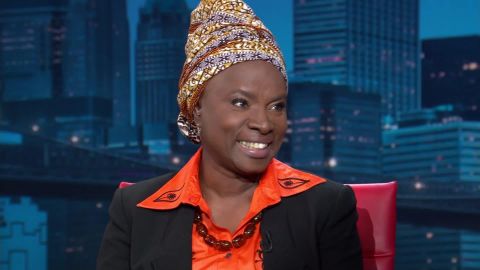Read Transcript EXPAND
CHRISTIANE AMANPOUR: What is it about right now for you?
ANGELIQUE KIDJO, SINGER: I think right now for me have a sense of emergency. In a world where I think we all are losing ground, a lot of things are happening, there’s a lot of anger and at the sight of the anger, you have a lot of people doing wonderful stuff. But we focus more on the anger than the positive things. And for me, music is about building bridges. It’s about bringing people together to a common share humanity. And that’s why I’m like — I’m devouring everything that comes my way and giving it back to the public. And it has been a really rollercoaster journey that I’m taking but I like that, it keeps me young.
AMANPOUR: I think it’s amazing. I mean, it keeps you young. That’s great. You definitely look young. We’re about the same age. You’re outdoing me.
KIDJO: OK.
AMANPOUR: But you’re doing something that you hadn’t necessarily done before. You, as I’ve said, doing some cover albums, cover songs. One of the bands that’s so well-known too, American and Western audiences, I guess, are the Talking Heads. Erupted on to the scenes in the early ’80s, I think. And you did a cover last year including a song that you said had inspired you, you know, once in a lifetime. You did their album “Remain in Light.” do you fancy just giving me some of your joy right now?
KIDJO: Oh, yes.
AMANPOUR: Go on then.
KIDJO: Letting the days go by. Letting the days go by. Into the blue again. Once in a lifetime
AMANPOUR: It’s great, Angelique. It really is. And when you sing, your whole face comes alive and it does definitely impact on the audience. But what was it about that song and that group? When did you first hear them and how did they inspire you?
KIDJO: I mean, I heard the song “Once in a Lifetime” actually when I arrived in 1983. Three months after I arrived, I was trying to tag along with friends in my music school. And even though you speak a language and share the same culture, pretty much, with people, it’s always difficult to leave your home. No one live in exile by choice and find it very fun. And some of my — the musical friend that I was making at that time said, “Well, let’s go raid my fridge. My parent just fill up my fridge.” I’m like, “Free food?” Student. I’m tagging along. I’m going along.
AMANPOUR: Raiding your friends’ parent’s fridge?
KIDJO: Yes.
AMANPOUR: Here in United States?
KIDJO: No, in Paris.
AMANPOUR: In Paris.
KIDJO: I’m like, “OK. Let’s go for it.”
AMANPOUR: So, you came from the African nation of Benin.
KIDJO: Benin where we have —
AMANPOUR: A communist dictatorship?
KIDJO: — a dictatorship.
AMANPOUR: Yes.
KIDJO: For the 10 or 12 years that followed their arrival, music was banned at radio.
AMANPOUR: Literally?
KIDJO: Literally. Our music was banned. Only thing you hear is (INAUDIBLE) day in and day out. Everything (INAUDIBLE).
AMANPOUR: And just so that we understand, that ready for the revolution, the fight continues.
KIDJO: The fight continues.
AMANPOUR: So, they banned pop music or —
KIDJO: All of it.
AMANPOUR: Why? What was the reason?
KIDJO: Well, it’s not — it might make her think about freedom.
About This Episode EXPAND
John Browne sits down with Christiane Amanpour to explain technology’s potential to solve our biggest problems. Angelique Kidjo joins the program to discuss her new album, “Celia.” Marc Brackett tells Michel Martin about the importance of emotional intelligence and his new book, “Permission to Feel.”
LEARN MORE


